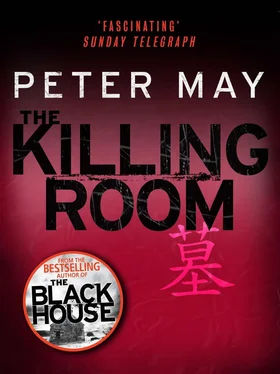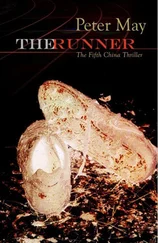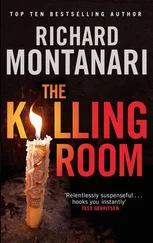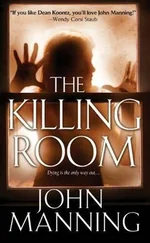Peter May - The Killing Room
Здесь есть возможность читать онлайн «Peter May - The Killing Room» весь текст электронной книги совершенно бесплатно (целиком полную версию без сокращений). В некоторых случаях можно слушать аудио, скачать через торрент в формате fb2 и присутствует краткое содержание. Год выпуска: 2012, Издательство: Quercus, Жанр: Триллер, на английском языке. Описание произведения, (предисловие) а так же отзывы посетителей доступны на портале библиотеки ЛибКат.
- Название:The Killing Room
- Автор:
- Издательство:Quercus
- Жанр:
- Год:2012
- ISBN:нет данных
- Рейтинг книги:5 / 5. Голосов: 1
-
Избранное:Добавить в избранное
- Отзывы:
-
Ваша оценка:
- 100
- 1
- 2
- 3
- 4
- 5
The Killing Room: краткое содержание, описание и аннотация
Предлагаем к чтению аннотацию, описание, краткое содержание или предисловие (зависит от того, что написал сам автор книги «The Killing Room»). Если вы не нашли необходимую информацию о книге — напишите в комментариях, мы постараемся отыскать её.
The Killing Room — читать онлайн бесплатно полную книгу (весь текст) целиком
Ниже представлен текст книги, разбитый по страницам. Система сохранения места последней прочитанной страницы, позволяет с удобством читать онлайн бесплатно книгу «The Killing Room», без необходимости каждый раз заново искать на чём Вы остановились. Поставьте закладку, и сможете в любой момент перейти на страницу, на которой закончили чтение.
Интервал:
Закладка:
The hands of all the remaining bodies had been examined and fingerprinted. Then together with Dr Lan, she had carried out repeat autopsies on the first two bodies and found the same betadine colouring around the entry wounds after cleaning away the dirt that still clung to the decaying flesh. They had also found several small sutures, tying off arteries where organs had been removed. Dr Lan made no comment on the fact that these had not appeared on his initial reports. It was clear to Margaret that the autopsies had been cursory and careless, and yet Dr Lan did not strike her as a careless man. His professional and personal embarrassment was patent. His integrity had been compromised, and Margaret suspected that he had been a reluctant instrument of political convenience. No doubt he had not envisaged having his work scrutinised by another professional. In order to keep him on side, she decided not to say or do anything that would draw attention to the obvious shortcomings of the initial autopsies.
She had concentrated, instead, on going over all the toxicology reports, with Dr Lan translating, and together they had discussed another possible cause of death. She had then studied all the x-rays taken of the body pieces as they had been found, and then the whole body x-rays.
Although she had not felt like it, she had agreed to Lan’s suggestion that they begin three fresh autopsies, Dr Lan and one of his team working in the twin-tabled room, Margaret in here on her own. The Chinese pathologists had made a point of asking her through to consult on every new or unusual finding, wishing to have her corroborate an opinion or make an alternative suggestion. Her concentration was now wavering.
She had almost completed her autopsy, having dealt fully with the torso and limbs and moving now to the head. Because the head had been severed so far down the neck, she had decided to leave the dissection of the neck until she dealt with the head. The larynx, trachea and mainstem bronchi were normally the most boring and routine of the autopsy procedures, only occasionally enlivened if the victim had been unfortunate enough to have choked to death on a piece of food that was still lodged in the throat. She had already noted that the distal portions of the trachea and the oesophagus were absent because of the removal of the lungs. Now, working on that portion of the neck still attached to the head, she lifted the skin of the front of the neck, using her fingers to bluntly dissect it from the underlying tissue, while pulling it up towards the chin. Then she freed the remaining trachea and oesophagus together from the surrounding muscles and blood vessels, running her scalpel along each side and pulling. At this stage, they would only come partially free, because they were still attached by the tongue at the top end.
Carefully, so as not to break through the skin of the neck from the inside, she took a long blade like a six-inch fillet knife and cut the tongue free from the jawbone by blindly drawing the blade gingerly along the inside of it. She then stuffed the tip of the tongue backwards, as if down the throat, and pulled it free, in the same movement completely removing the neck organs — tongue, portions of oesophagus and trachea, larynx and thyroid gland.
Flipping them over, she then took a pair of scissors and cut open the oesophagus, like opening up a soft hose, which she then cut free from the trachea. Now that the trachea, held open by incomplete rings of cartilage, was revealed, she was able to run the scissors up the back of it, taking advantage of the break in the cartilage. She checked the laryngeal cartilage, or Adam’s apple, for fractures, then finding none pried it apart to reveal the smooth pink-grey mucosa of the vocal folds. Immediately she spotted the whiter patches of several polypoid nodules.
‘How is it going?’
She looked up, her concentration broken for the moment, to see Li standing in the doorway. He looked tired, too, but she immediately felt her own fatigue lifting. ‘Hi,’ she said. And then almost straight away her lassitude returned as she saw Mei-Ling appearing behind him. Apparently it was impossible for Li to go anywhere without her.
He walked in and glanced at the woman on the table. She looked unreal somehow, waxen yellow and lifeless, like pieces of a wax corpse used for instruction in a professor’s teaching lab. There was something about the expression fixed on her face, barely discernible now because of decomposition, that was odd. As if it had been frozen in a moment of pain or fear or both. Her hair was smeared across it, and there was something terribly sad conveyed by her expression, an insight into the last moments of her life, made almost eerie by the absence of her eyes.
‘Were the eyes gouged out in some kind of attempt to disguise the face, do you think?’ he asked.
‘They weren’t gouged, they were surgically removed,’ Margaret said, and Li had an immediate picture in his mind of a large glass jar filled with eyes staring out at him.
‘Why would someone want to do that?’ Mei-Ling asked.
‘Why would someone want to do any of this?’ Margaret said.
Li was looking at the dead woman’s face again. ‘Was she in pain, do you think, when she died?’
Margaret looked at her expression. ‘Trying to reach a high note, maybe.’ She smiled wanly and Li frowned.
‘What do you mean?’
She indicated the neck she had just sectioned, running a finger down each of the pink-grey folds she had uncovered. ‘The vocal cords,’ she said. ‘If you look closely you’ll see small patches of white, and if you look more closely still, you’ll see that they are caused by tiny reactive pedunculated polyps. Effectively small, non-cancerous tumours, known in the trade as “singer’s nodules”.’
‘You mean this woman was a singer?’ Mei-Ling asked.
‘Can’t say for sure,’ Margaret said. ‘But she was someone who used her voice a lot. And if you look at her teeth you’ll see she was a heavy smoker. Which always makes the condition worse. Now, maybe she was one of those conductresses you hear screaming through the loudspeaker system at passengers on passing buses, but if you look at her fingernails you’ll see she’d had a manicure not long before her death. I know you don’t like to talk about “class” in China, but I don’t think your average bus conductress gets her nails manicured. Wrong class. So my guess would be that this lady was a classical singer of some sort. Aged maybe around thirty.’
Li nodded appreciatively. ‘Well, that at least gives us something to go on.’
‘And something else,’ Margaret said. She crossed to the long, polished stainless steel worktop and shuffled through the envelopes of x-rays lying there until she found what she was looking for. She removed two x-rays from one of the envelopes and laid one on a lightbox and switched it on. Immediately they saw that it was the x-ray of a foot. ‘This is one of the ladies being autopsied next door right now.’ She lifted the sheet off and replaced it with the other. ‘This one shows it better.’ She leaned over it, and with her finger traced the line of the second and third metatarsals. ‘These bones that run between the toes and the rest of the structure that makes up the ankle and the heel …’
‘Metatarsals,’ Mei-Ling said.
Margaret flicked her a thoughtful glance. ‘That’s right.’ She turned back to the x-ray. ‘You can see scarring there on these middle two. Small calluses where stress fractures have failed to heal. Difficult to tell from these whether they are incomplete fissures or actual breaks.’
‘What does that tell us?’ Li asked.
‘Regardless of what caused the fractures, continued and unprotected weight bearing has almost certainly caused them to heal poorly. And if you want to take a look at the girl on the table next door, you’ll see how well developed the muscles are in her legs, and in her shoulders and arms and neck. My guess is that she was an athlete of some sort, possibly a gymnast.’
Читать дальшеИнтервал:
Закладка:
Похожие книги на «The Killing Room»
Представляем Вашему вниманию похожие книги на «The Killing Room» списком для выбора. Мы отобрали схожую по названию и смыслу литературу в надежде предоставить читателям больше вариантов отыскать новые, интересные, ещё непрочитанные произведения.
Обсуждение, отзывы о книге «The Killing Room» и просто собственные мнения читателей. Оставьте ваши комментарии, напишите, что Вы думаете о произведении, его смысле или главных героях. Укажите что конкретно понравилось, а что нет, и почему Вы так считаете.












